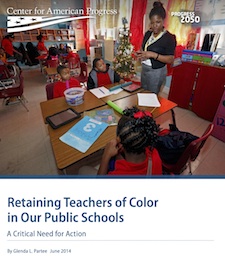 The Center for American Progress has released a new study documenting the importance of efforts to retain Black and other minority teachers in our nation’s public schools. Among the findings of the report are:
The Center for American Progress has released a new study documenting the importance of efforts to retain Black and other minority teachers in our nation’s public schools. Among the findings of the report are:
* At the national level, students of color make up almost half of the public school population. In contrast, teachers of color — those who are not non-Hispanic Whites — make up only 18 percent of all teachers. In some states, this large gap is widening even further.
* Up to 50 percent of new teachers leave the profession within five years.
* Teachers of color are more likely to work in public schools that serve high-minority, high-poverty urban communities than their White counterparts.
* Over the past two decades, the growth in number of teachers of color has almost doubled, outpacing the growth of white teachers. However, successful efforts to recruit more teachers of color to schools in disadvantaged areas are largely negated by the revolving door of attrition: In general, teachers of color have higher turnover rates than do other teachers.
* Male teachers of color are more than two times as likely as female teachers of color to leave the field.
* Once in the classroom, challenging teaching conditions and a lack of professional and administrative support quickly drive teachers of color from the profession.
Author Glenda L. Partee, former associate director for teacher quality at the Center for American Progress, offers a number of recommendations on how to increase the retention of teachers of color in our public schools.
The report, Retaining Teachers of Color in Our Public Schools, may be downloaded by clicking here.


The report is fascinating. I am a teacher in Alabama and currently trying to enter into a graduate school to have the credentials to be an educational leader. Questions like why the low representation of black men bothered me, so I started writing–in my first year of teaching–small things that I saw happening in the school and school system. These things would have deterred me from my job (it would deter most) if I were not strong-minded and caring.
I could write for day, but I will focus on my main issues (the ones I will publish) as to why we do not stay in the classroom. I will not offer recommendations to all issues, but will leave the door open for others to voice their comments.
The first issue is that the schools in the urban areas can have devastating behavior issues that makes no real Black man want to deal with. Instead of solving these issues, administrators look at trying to cover up the horrific problem by ignoring behaviors they seem petty just to make their column under discipline in the data report look good.
The second issue is one that you mention in your report, these alternative programs that offer shortcuts into teaching. In my 3 years of teaching, I have already worked with more colleagues that saw teaching as a “back-up job” (I want to emphasis the word job). These are people that teach because they had not been accepted into law school, graduate school, or med school yet. These are people that probably majored in History in undergraduate school. They could not find a job, so they go back to school, and take the six courses in an Alt-A Master Program that certifies them as a teacher. If we are passionate about teaching, we do not want to work beside someone who is not, and deal with the problems I stated as the first issue.
There are others that I have, but do not want to spoil by publication. Factors like pay, respect & pride, better opportunities are some of the other issues I discuss.
I plan to become an educational leader in a school someday, starting my own school (if charter schools ever come to AL), and working for a research company similar to Center for American Progress. I will mention this report to others to read and use for the betterment of their school and/or school system.